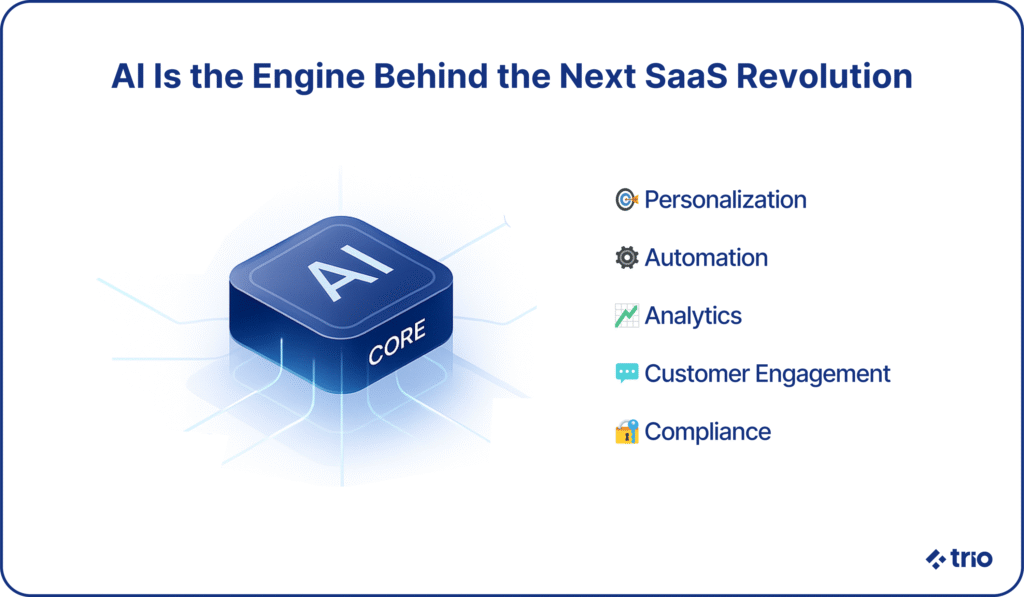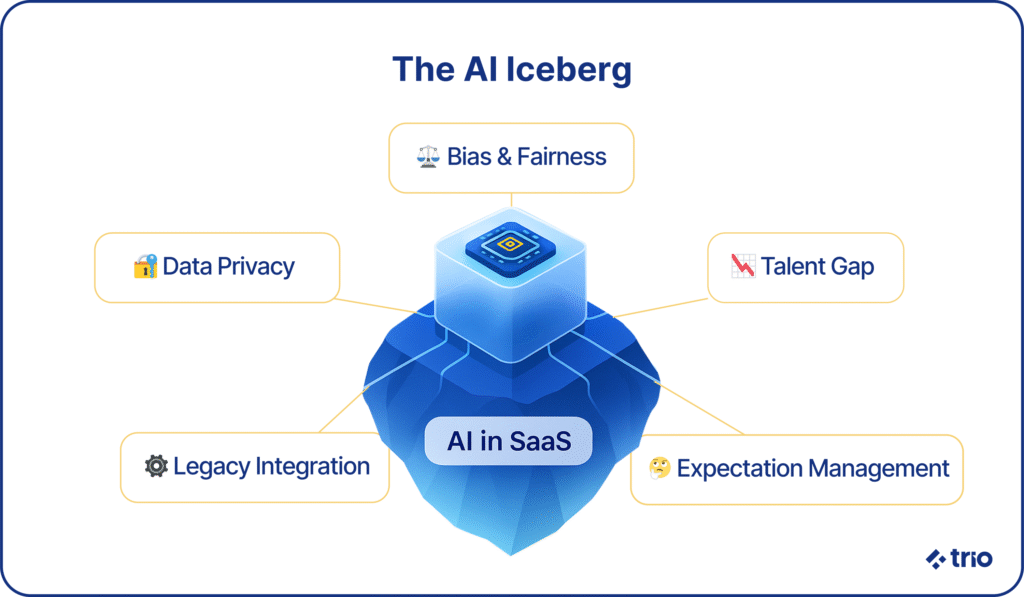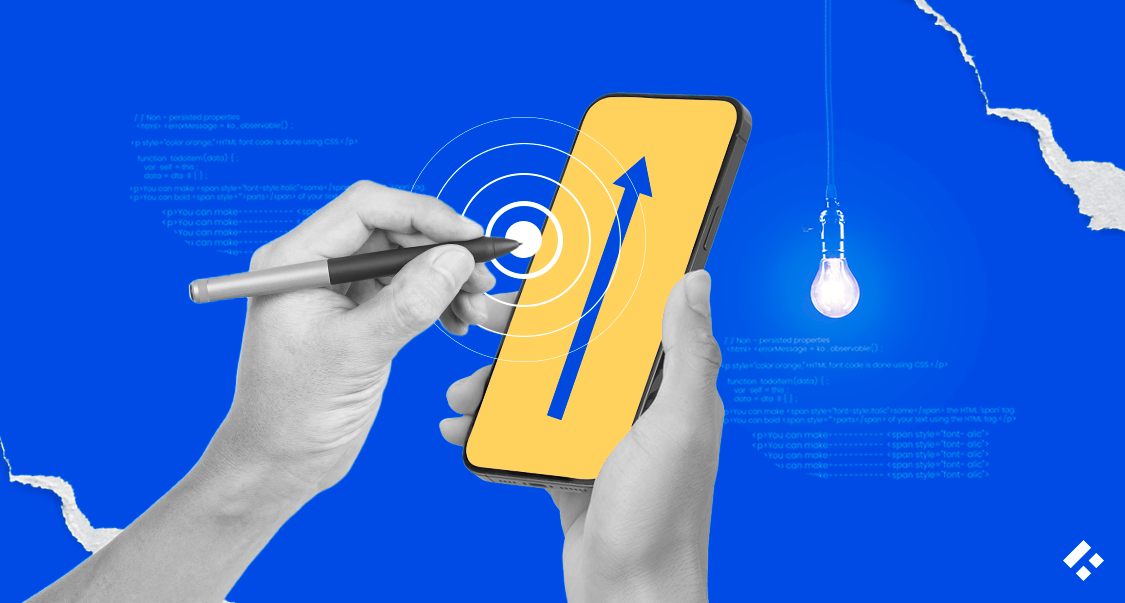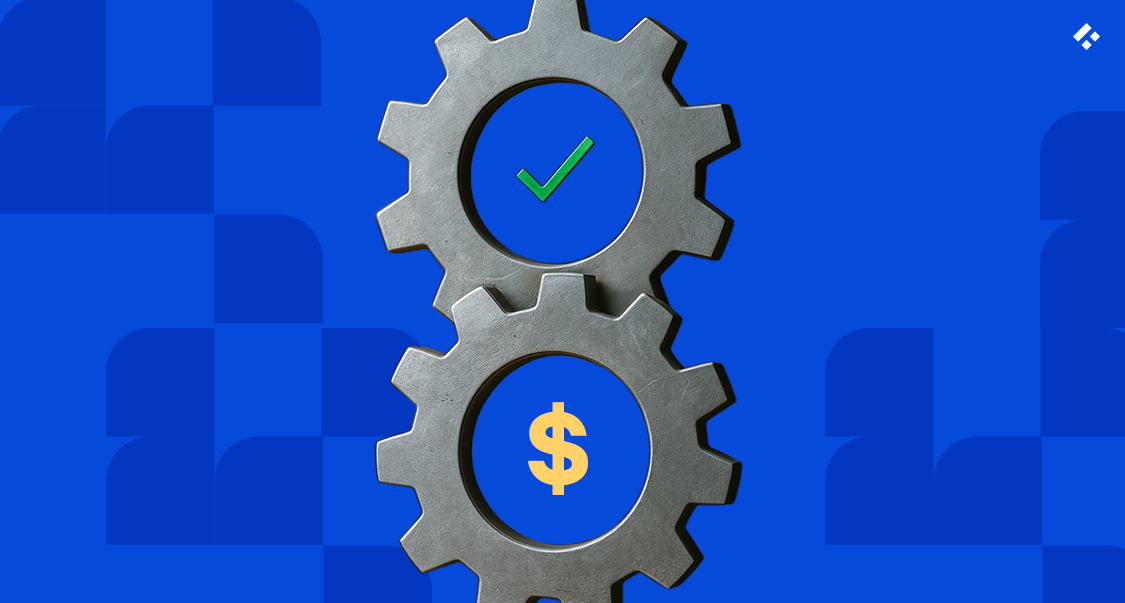In 2024, the average company used 112 SaaS (Software as a Service) apps. By the end of 2025, it is estimated that 50% of SaaS companies on the market will have integrated artificial intelligence (AI) into their platforms.
There is no denying that AI tools are incredibly popular and that the future of SaaS products seems to be AI-powered. But what are the benefits of AI for SaaS startups?
There are many benefits, some of which include personalization, customer engagement, efficient product development, scalability, dynamic pricing, workflow automation, analytics, security, and compliance.
We’ll go through all of these benefits, the challenges you might encounter when trying to build AI-driven SaaS solutions, industry trends, and even step-by-step instructions on how you can utilize AI capabilities in your SaaS platforms.
If you are interested in developing products for your SaaS business or perhaps integrating AI technologies into your existing products, Trio might be the right business partner for you.
We have the top 1% of developer applicants at our disposal for your outsourcing and staff augmentation needs. With our focus on practical experience in certain niches alongside soft skills and team integration, we can pair you with the perfect developer for your project rather than providing a one-size-fits-all solution.
But before you decide if building AI SaaS solutions is for you, let’s make sure you understand exactly what they are.

What is AI in SaaS?
AI in SaaS generally refers to the integration of AI products into SaaS platforms. The integrated AI solutions can be in the form of machine learning, natural language processing (NLP), predictive analytics, and even automation.
The goal of these solutions is generally to allow the SaaS vendors to stay ahead of their competition through a unique offering or some internal productivity improvement.
Some popular use cases we’ve encountered, or even helped develop here at Trio, include software solutions that automate tasks that improve customer relationship management (think of the AI systems like chatbots that respond to your customers instantly), AI algorithms that analyze lare quanitites of data that humans are not physically capable of, and even features like dynamic personalization.
Key Benefits of AI in SaaS Startups
We’ve already alluded to a few of them, but let’s look at the benefits of utilizing the power of AI and how it is reshaping the SaaS industry. This information should give you a good idea of where you can implement AI in your business processes, whether you are a small startup or an established SaaS enterprise.
1. Personalization and Customer-Centricity
Whether they run on mobile or web-based platforms, AI gives software applications incredible personalization capabilities. Usually, this is done by analyzing behavior, preferences, and engagement patterns. Think of the recommended products you are offered on e-commerce platforms, or the related content on platforms like YouTube.
These AI-driven features are transforming the SaaS market by allowing software companies to provide exactly what their clients need.
In many ways, these tools empower startups by allowing them to stand out in an already saturated market. However, the use of these tools is becoming more normalized as users start to see what was previously considered to be the latest advancements in AI technology as some of the most basic requirements, raising the barrier to entry in the industry.
2. Enhanced Customer Engagement and Retention
Overall customer success can be measured using a variety of performance indicators related to customer experience and overall customer retention.
In order to increase these metrics, companies can embrace tools like AI chatbots and recommendation engines to keep customers on their site for longer, and make sure that they have them contemplating a purchase.
We have also noted that a lot of companies are starting to use AI tools to address customer needs proactively by creating tools that are able to answer common queries quickly, and ultimately by increasing the perception users have of SaaS providers in an effort to build trust in their brand.
3. Smarter Product Development and Innovation
AI helps you get through processes like iteration and idea generation faster than ever before. Many AI algorithms are able to analyze competitors’ features and help startups identify gaps or refine their product based on user expectations they might have missed.
This leads to faster product creation and, in theory, higher quality SaaS tools.
Once these tools are created, you can also make use of AI through predictive modeling and analyzing the data provided by your A/B tests.
4. Operational Efficiency and Scalability
Within your company, you will always have certain workflows that are redundant or that require you to analyze large quantities of information.
That’s where a firm like Trio comes in. We specialize in helping companies build software applications that not only take care of their redundant tasks, like data entry, allowing them to free up employees for other work, but also help them analyze data and make predictions regarding critical processes like resource allocation or even site maintenance.
We work alongside your existing business systems and software, ensuring integration is seamless and your solutions are ready to scale in the future.
Dynamic Pricing and Revenue Optimization
Markets are sometimes unpredictable. Thanks to the speed at which the technology markets change and innovate, they are no exception.
Cutting-edge AI tools can not only assist in analyzing shifting markets and user demands but also help you come up with strategies to stay competitive.
The near-instantaneous speeds that many AI companies have been able to produce in their products, along with the flexible nature of cloud-based software applications, let SaaS companies of various sizes pivot quickly regarding their services, pricing, and more.
6. Advanced Analytics and Actionable Insights
We’ve already mentioned that AI can look at a lot of information very quickly, identifying trends that people might have missed. These features allow even small startups to gain access to deep analytics that they can then use to make decisions.
AI may even be able to produce actionable recommendations tailored based on the knowledge it has of the company.
7. Stronger Cybersecurity and Compliance
Fraud and cyber attacks need to be stopped quickly, almost as they are happening, in order to keep your customers’ information safe. AI tools can detect anomalies in real time and flag any suspicious activities. Agentic AI can even initiate sequences of events that deal with that anomaly.
The automated compliance reporting that follows will also help you improve in the future and create robust security measures, further increasing your brand reputation.
Key Challenges and Ethical Considerations
AI is a really great tool to use in the SaaS space. But, as the use of AI has become more commonplace, some ethical dilemmas and potential challenges have come to light. These include:
- Bias in AI models and fairness: If your models aren’t trained correctly, they can develop biases that may directly affect your clients.
- Data privacy and security risks: When can you feed AI systems your clients’ sensitive data responsibly? Regulations like GDPR have become more important than ever.
- Integration challenges with legacy systems: If you have an older tech infrastructure, it can be difficult to integrate new AI tools without help from seasoned professionals.
- Lack of skilled talent and evolving regulatory requirements: Supply and demand aren’t quite matched when it comes to AI professionals, especially as governments are cracking down on AI use and developers need to spend more time on their education to ensure compliance.
- Managing customer expectations: You need to understand what AI can and can’t do, and if you are offering it as a service to your clients, you need to be transparent about it.

How to Overcome AI Challenges in SaaS
So, how do you overcome these AI challenges, and the many more that might come up in the SaaS world?
Start by building a responsible AI framework. You need to establish your ethical guidelines from the start, along with your governance structures and audit process. Know that biases may appear and monitor for them on a regular basis to ensure fairness. And don’t forget to keep track of everything you’re doing for when governments come knocking.
Ensuring transparency and explainability in your frameworks, or being able to trace how the AI came to its conclusions, will not only help you ensure a lack of biases but will also be necessary when you are dealing with stakeholders or need to explain them to your users.
Skilling your workforce and AI literacy are other musts. While you can rely on companies like Trio with trustworthy developers, it is always beneficial to make sure some of your in-house staff have the training to understand and work with these models effectively.
Finally, don’t try to do it all on your own. AI is a great tool for standing out, but trying to develop everything on your own will result in you falling behind. Partnerships and collaborations can give you a jump start, especially if you are a smaller company.
How to Build AI SaaS Applications
Now that you know the basics, how do you actually go about building SaaS applications? There is no one-size-fits-all approach, but here are the generalized steps you could follow.
1. Identifying Market Needs and Opportunities
In order to create a new product that will have at least some level of success, you need to do some market research and identify areas where you can add value, while considering the capabilities of AI.
Customer pain points, competitors, and trends are all areas where you can gather information.
2. Choosing the Right Tech Stack
You may want to get an experienced developer on board at this point. Choosing the right tech stack (programming language, tools, and frameworks) will allow you to create exactly what you envision without running into technical limitations further down the line.
The most popular languages for this kind of development are probably Python and JavaScript, while tools like TensorFlow, PyTorch, and Hugging Face will let you do almost everything you need in terms of AI, and cloud platforms like AWS and GCP will give you the infrastructure you need to host and deliver your product online.
We’ve written an entire article on Mastering AI Development, so make sure to check it out for a deep dive.
3. Designing a Scalable and Flexible Architecture
You need to be able to scale quickly, whether that’s up when you have a massive usage spike, or down to avoid additional costs. You also want to be able to make changes quickly, to avoid downtime as much as possible.
For these reasons, it’s pretty standard to use microservices and API-first designs to make changes quickly.
Multi-tenancy is also important as it lets you create one instance of your software and allows multiple people to use it without their data overlapping. This is what allows you to offer your software online, instead of needing each client to download and install it.
4. Testing, Launching, and Iterating MVPs
You can develop your entire product, with all the bells and whistles, but that is expensive, and you have no proof that people are even going to use your product.
An MVP allows you to create the most basic features of your product, integrate your AI features, and get it on the market so you can start gathering user feedback.
Once you know users are finding value in your MVP, you can create additional features based on real requests or comments, while earning money.
5. Post-Launch Scaling and Optimization
Many people think software development is finished once the product is complete, but this couldn’t be further from the truth in the SaaS space. You need to keep monitoring your product, making sure it’s performing as well as possible, and adding additional features to scale it.
The world around you will keep evolving without you. If you don’t adjust, or if problems appear without you realizing it, your users will simply find someone else to provide what you cannot.

Real-World AI Use Cases in SaaS Companies
Let’s take a look at how AI is transforming the SaaS industry by seeing how real-world SaaS giants are using AI in their products to keep their positions at the forefront of the market:
- Marketing Automation and Smart Campaigns: HubSpot and Marketo are both using AI for predictive insight in their lead scoring and even offering personalization in their outreach services.
- Data Analytics and Predictive Reporting: Tableau is offering deeper insight and forecasting using the power of AI.
- Intelligent CRM and Customer Support: Salesforce Einstein and Zendesk have created automated responses, ticket routing, and more using Chatbots and NLPs.
- Product Development Powered by AI: Notion and ClickUp use automation to optimize workflows and make product development more efficient.
- Employee Training and Knowledge Management: There are a variety of AI-based learning platforms out there, with Duolingo making headlines recently.
Emerging Trends in AI and SaaS Startups
No one can deny the incredible use of Generative AI and Multi-Modal Models since the rise of OpenAI’s ChatGPT. It feels like there is a new model every other day, just a little different or more specialized from the ones that came before it.
However, Agentic AI and autonomous systems are growing too. These are the ‘next-step’ AI systems that need very little human contact once created. One of their most recognizable features is the fact that they can start tasks on their own, adapting based on the results of these actions.
We’ve also seen a lot of AI integration with IoT (Internet of Things), especially in fields like manufacturing and healthcare, where sensors may collect information that can be processed by AI for real-time insights.
These are just the technical trends based on AI’s abilities. The overall sustainability of these systems has been under considerable scrutiny. Processing centers draw a lot of power and water. A big focus has been on making things more efficient to prevent potential issues going forward.
If you are interested in hiring SaaS or AI developers, Trio has spent many years gathering the best-of-the-best. Our focus on having developers at the forefront of their relevant industries means you can trust that the person you are connected with understands the latest trends and regulations.
Through staff augmentation or outsourcing, you don’t have to worry about a long-term hire. And, by making use of nearshore and offshore talent, we can ensure cost-effective development without sacrificing quality.
Ready to start or have any questions? Reach out to schedule a free consultation!





